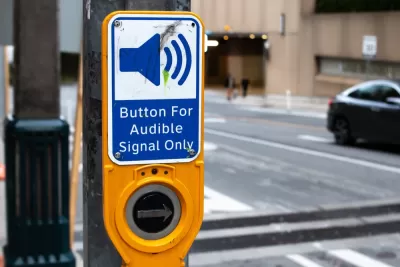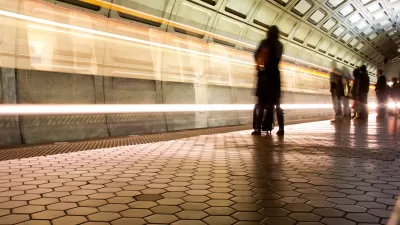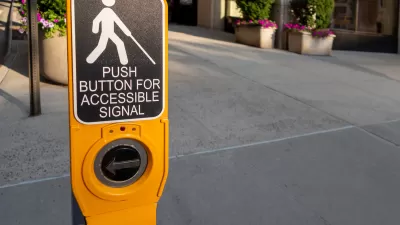A federal judge ruled that the city fails to provide “meaningful access” to many of its streets due to a lack of infrastructure for pedestrians with vision impairments at most of the city’s intersections.

A federal judge ruled that the City of Chicago has not provided sufficient accommodations for people with disabilities in violation of the Americans with Disabilities Act (ADA), reports Eli Ong for WGN 9. “The complaint, filed at the time by the federal government, alleged the City failed to provide people who are blind, have low vision or are deaf-blind with accessible pedestrian signals (APS’s) at intersections, e.g., the equivalent of ‘walk/don’t walk’ visual signals that indicate when it is safe to cross the street for pedestrians without visual disabilities.”
According to Ong, “fewer than 1% of intersections equipped to provide sighted pedestrians visual signals (nearly 2,800) were equipped with APS’s for people who are blind or have low vision.” This amounts to a lack of “meaningful access” to the city’s transportation network and, per a press release from Disability Rights Advocates, “may be the worst of any major metropolitan area in the United States.”
In the same press release, Jelena Kolic, Senior Staff Attorney at Disability Rights Advocates, says, “Chicago has long been famous for its walkability. Thanks to this decision, blind residents will be much better equipped to enjoy that walkability.” The decision also “sends a message to cities and towns across the state and around the country that they can no longer deny pedestrians who are blind full and equal access to signalized intersections,” says Ray Campbell, one of the plaintiffs in the case.
FULL STORY: Federal judge finds City of Chicago liable, violated Americans with Disabilities Act

Study: Maui’s Plan to Convert Vacation Rentals to Long-Term Housing Could Cause Nearly $1 Billion Economic Loss
The plan would reduce visitor accommodation by 25,% resulting in 1,900 jobs lost.

North Texas Transit Leaders Tout Benefits of TOD for Growing Region
At a summit focused on transit-oriented development, policymakers discussed how North Texas’ expanded light rail system can serve as a tool for economic growth.

Why Should We Subsidize Public Transportation?
Many public transit agencies face financial stress due to rising costs, declining fare revenue, and declining subsidies. Transit advocates must provide a strong business case for increasing public transit funding.

How to Make US Trains Faster
Changes to boarding platforms and a switch to electric trains could improve U.S. passenger rail service without the added cost of high-speed rail.

Columbia’s Revitalized ‘Loop’ Is a Hub for Local Entrepreneurs
A focus on small businesses is helping a commercial corridor in Columbia, Missouri thrive.

Invasive Insect Threatens Minnesota’s Ash Forests
The Emerald Ash Borer is a rapidly spreading invasive pest threatening Minnesota’s ash trees, and homeowners are encouraged to plant diverse replacement species, avoid moving ash firewood, and monitor for signs of infestation.
Urban Design for Planners 1: Software Tools
This six-course series explores essential urban design concepts using open source software and equips planners with the tools they need to participate fully in the urban design process.
Planning for Universal Design
Learn the tools for implementing Universal Design in planning regulations.
City of Santa Clarita
Ascent Environmental
Institute for Housing and Urban Development Studies (IHS)
City of Grandview
Harvard GSD Executive Education
Toledo-Lucas County Plan Commissions
Salt Lake City
NYU Wagner Graduate School of Public Service




























